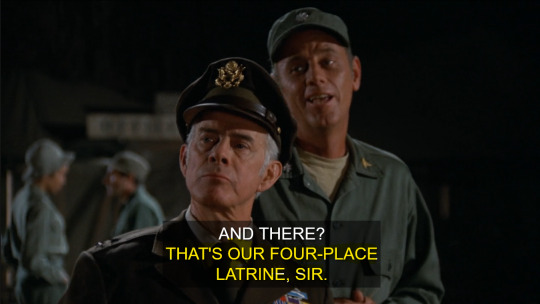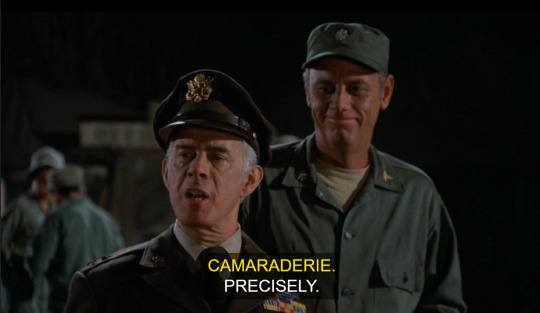#Lt Col Henry Blake
Text
It's doesn't matter how many times I watch through M*A*S*H, Henry's discharge from the 4077 kills me everytime.
And the episode following when Trapper gets his orders.
The descent of Hawkeye into a depression is also hard to watch.
0 notes
Text
RIP Lt. Col. Henry Blake, you would've really loved the Bass Pro Shop pyramid
3K notes
·
View notes
Text
HUGE M*A*S*H NEWS!
Direct of the MASH Matters Facebook Page

M*A*S*H: THE COMEDY THAT CHANGED TELEVISION, AN ALL-NEW TWO-HOUR CELEBRATION OF TELEVISION’S MOST INFLUENTIAL SITCOM
NEW ORIGINAL SPECIAL AIRS MONDAY, JANUARY 1, ON FOX
Featuring New Interviews with Cast Members Alan Alda, Gary Burghoff,
William Christopher, Jamie Farr, Mike Farrell, Wayne Rogers and Loretta Swit,
as well as Original Series Executive Producers Gene Reynolds and Burt Metcalfe
Plus Rarely-Seen Archival Interviews with Writer/Producer Larry Gelbart,
and Stars Larry Linville, Harry Morgan, McLean Stevenson and David Ogden Stiers
In the all-new two-hour special, M*A*S*H: The Comedy That Changed Television, premiering Monday, January 1 (8:00-10:00 PM ET/PT) on FOX, join the men and women who made M*A*S*H as they celebrate one of the most beloved, enduringly popular, often quoted and influential comedies ever created.
As the definitive look at the 14-time Emmy-winning television classic, the special centers around new interviews with original cast members Alan Alda (Capt. Benjamin Franklin "Hawkeye" Pierce), Gary Burghoff (Cpl. Walter "Radar" O'Reilly), William Christopher (Father Francis Mulcahy), Jamie Farr (Cpl./Sgt. Maxwell Q. "Max" Klinger), Mike Farrell (Capt. B.J. Hunnicutt), Wayne Rogers (Capt. "Trapper" John McIntyre) and Loretta Swit (Maj. Margaret "Hot Lips" Houlihan) and series executive producers Gene Reynolds and Burt Metcalfe. In these intimate, highly personal remembrances, the creation and evolution of the show’s iconic characters are revealed, alongside rare and never-before-seen behind-the-scenes footage, photos and stories.
Writer/producer Larry Gelbart, as well as additional series stars Larry Linville (Maj. Frank Burns), Harry Morgan (Col. Sherman T. Potter), McLean Stevenson (Lt. Col. Henry Blake) and David Ogden Stiers (Maj. Charles Emerson Winchester III) are remembered through a vibrant collection of clips from the series as well as in rarely-seen archival interviews. With unique experiences, observations and memories from 11 seasons of M*A*S*H, this special will make audiences laugh, touch their heartstrings, and leave them on a nostalgic high while celebrating the sustained brilliance of the iconic sitcom.
“M*A*S*H is not only a great television series, it is a cultural phenomenon. It has made multiple generations of viewers laugh, cry and think, often in the same episode,” said Executive Producers John Scheinfeld and Andy Kaplan. “We are excited to team with FOX to create this unprecedented window into an innovative television classic.”
"M*A*S*H is among the most iconic sitcoms in the annals of television history. It's a timeless show that comedically captures the 4077th medical corps and how they managed to maintain their sanity while saving lives on the front lines of the Korean War,” said Dan Harrison, EVP, Program Planning & Content Strategy, FOX Entertainment. “Larry Gelbart, Gene Reynolds and Burt Metcalfe brought this incredible comedy to life thanks to their ensemble cast led by the incomparable Alan Alda. FOX is proud to celebrate the landmark achievements of one of the best comedies ever created."
The M*A*S*H two-and-a-half-hour series finale that first aired on CBS in 1983 remains the highest rated telecast in television history, delivering an incredible 77 audience share and 60.2 rating. To-date, the show has never left the air, continuously running in syndication, on basic cable and now streaming on Hulu. The series was produced by 20th Television.
M*A*S*H: The Comedy That Changed Television is directed by John Scheinfeld (Reinventing Elvis: The ’68 Comeback, The U.S. vs. John Lennon and What The Hell Happened To Blood, Sweat & Tears?) with Scheinfeld and Andy Kaplan as Executive Producers.
Viewers can watch M*A*S*H: The Comedy That Changed Television next day on Hulu, Fox.com, On Demand and FOX Entertainment’s streaming platform, Tubi. On Demand is available for customers of Cox Contour TV, DIRECTV, DISH, fuboTV, Hulu + Live TV, Optimum, Spectrum, Verizon FiOS, XFINITY, YouTube TV and many more.
#m*a*s*h#mash#mash 4077#m*a*s*h 4077#hawkeye pierce#mash4077#alan alda#trapper john mcintyre#mike farrell#wayne rogers
85 notes
·
View notes
Photo

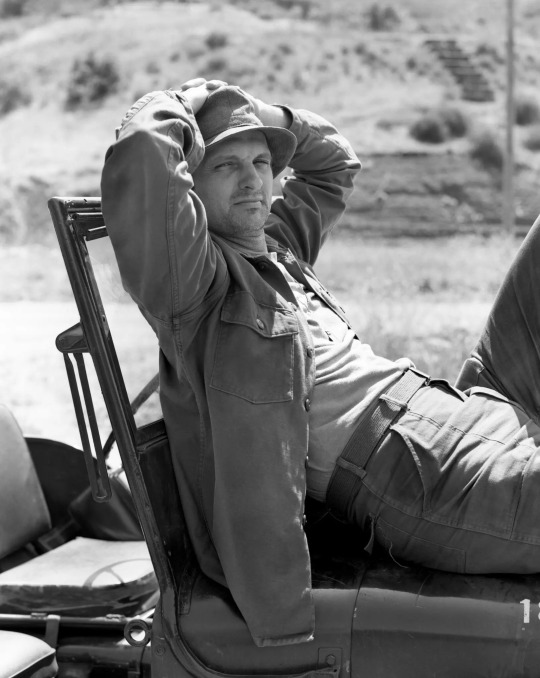
here’s the NYtimes interview with alan alda reflecting on the fiftieth anniversary of M*A*S*H (text below the cut)!!
By Saul Austerlitz
Published Sept. 16, 2022 Updated Sept. 17, 2022, 1:10 p.m. ET
When we think of the default mode of much of contemporary television — mingling the tragic and the offhand, broad comedy and pinpoint sentiment — we are thinking of a precise mixture of styles, emotions and textures first alchemized by “M*A*S*H.”
Created by Larry Gelbart and Gene Reynolds, “M*A*S*H” aired on CBS from 1972 to 1983. (It is currently available to stream on Hulu.) Over the course of its 11-year run, it featured alcohol-fueled high jinks and other shenanigans alongside graphic surgical sequences and portrayals of grief, blending comedy and drama in a fashion rarely seen before on television. Set among the doctors and nurses of a Korean War mobile surgical unit, “M*A*S*H” made use of the mockumentary episode decades before “The Office” ever tried it, featured blood-drenched story lines long before “The Sopranos” and killed off beloved characters without warning well before “Game of Thrones.”
The “M*A*S*H” series finale, titled “Goodbye, Farewell, and Amen,” remains the most-watched non-Super Bowl program ever broadcast on American TV. The heart of the series was Alan Alda, who played the acerbic and devoted surgeon Hawkeye Pierce throughout the show’s more than 250 episodes and also wrote and directed dozens of them.
The actor revisited “M*A*S*H” in a video interview ahead of the show’s 50th anniversary, on Sept. 17. Alda, 86, who was diagnosed with Parkinson’s disease in 2015, discussed famous scenes, the series’s battles with CBS (“They didn’t even want us to show blood at the beginning”) and why he thinks the audience connected so deeply with “M*A*S*H.” These are edited excerpts from the conversation.
How have you been feeling?
Good, thank you. You mean with regard to Parkinson’s or the Covid or what?
All of the above, I suppose.
Parkinson’s I’m on top of. And I haven’t come down with Covid yet.
What does it mean to you to know that people are still interested in “M*A*S*H” 50 years later?
I got the script submitted to me when I was making a movie in the Utah State Prison. And it was the best script I had seen since I’d been in prison. I called my wife and I said: “This is a terrific script, but I don’t see how I can do it. Because we live in New Jersey, and it has to be shot in L.A. And who knows? It could run a whole year.” To go from that to 50 years later, it’s still getting, not only attention but it’s still getting an audience, is a surprise.
What kinds of conversations did you have with Larry Gelbart before the show began?
With “All in the Family,” I think the door was open to doing stories about things that really mattered. So when I got out of prison and went down to L.A. to talk to them, the night before we started rehearsing the pilot, I wanted us all to agree that we wouldn’t just have high jinks at the front. That it would take seriously what these people were going through. The wounded, the dead. You can’t just say it’s all a party. And we talked until about 1 in the morning at a coffee shop in Beverly Hills.
Do you feel there was a shift over the first season away from the booze-fueled humor of the early episodes?
Yeah, there was. Partly because people who were submitting story lines thought that that’s what was wanted. Larry Gelbart rewrote most of the shows the first season. Midway through the first season, there was a show called “Sometimes You Hear the Bullet,” and that was a real turning point. Because in that show, a friend of Hawkeye’s shows up among the wounded, and he dies on the operating table. That’s the moment where McLean Stevenson [as Lt. Col. Henry Blake] says: “There’s two rules in war: Young men die, and then Rule 2 is there’s nothing you can do about it.” Something like that. [The exact quote: “There are certain rules about a war. And rule No. 1 is young men die. And rule No. 2 is, doctors can’t change rule No. 1.”]
The network was furious about this. Some guy in charge of programming said, “What is this, a situation tragedy?” Soon after that, we were getting more popular. And the more popular you get, the less they complain.
Was CBS also concerned about the language used to tell these stories?
The most striking example to me was early in the series. Radar [Gary Burghoff] is explaining to somebody that he’s unfamiliar with something. And he said, “I’m a virgin at that, sir.” With no sexual context. It was just that he’d never done something before. And the CBS censor said: “You can’t say the word ‘virgin.’ That’s forbidden.” So the next week, Gelbart wrote a little scene that had nothing to do with anything. A patient is being carried through on a stretcher. And I say, “Where you from, son?” And he says, “The Virgin Islands, sir.”
Early in the show’s run, Gelbart and Reynolds went to South Korea and recorded 22 hours of interviews with doctors, nurses, pilots and orderlies there. How did those interviews make their way into story lines for the show?
We had reams of transcripts of those conversations. I would go through them looking for ideas for stories. And I could see that the other writers were doing the same thing, because there’d be circles around sentences and words. Sometimes one little phrase would spark the imagination of one of us, and that phrase could turn into a story.
Larry and Gene went to Korea at the end of the second season, and they got a lot of material for stories. But they had also found that we had, by paying attention to the lives that they lived, we had made up stories that were very similar to things that had actually happened.
People may not remember that you directed 32 episodes of “M*A*S*H” and wrote 19 episodes. How did you start getting interested in writing and directing?
At the end of the first season, I wrote a show called “The Longjohn Flap.” I borrowed the idea of “La Ronde,” but made it long johns instead because it was reflective of what their lives were like in the cold. I had been trying to learn writing since I was 8 years old. I wanted to be a writer before I wanted to be an actor.
Were there story lines that you thought “M*A*S*H” hadn’t quite tackled yet that you wanted to bring into the world of the show as a writer and director?
When I wrote, I tried to find out a little bit more about each of the characters. Who is Klinger [Jamie Farr] really? What was underneath — I almost said, what was underneath the dresses. [Laughs.] What was underneath the wearing of the dresses? Who was Margaret [Loretta Swit]?
I see on the internet that people assumed that because I was politically active, trying to get the Equal Rights Amendment passed, that in my writing I was trying to make political points, too. And I wasn’t. I really don’t like writing that passes as entertainment when it’s really propaganda. I want to hear a human story.
The unexpected death of Colonel Blake (McLean Stevenson) in the Season 3 finale, “Abyssinia, Henry,” remains one of the biggest surprises in television history. What was it like to shoot that sequence?
Gelbart showed me the scene. I think [it was] the morning of the shoot. I knew, but nobody else knew. He wanted to get everybody’s first-time reactions. And it really affected Gary Burghoff on camera. I think everybody was grateful for the shock.
It shocked the audience, too. I had a letter from a man who complained that he had to console his 10-year-old son who was sobbing. But it was one of the ways for the adults in the audience to realize that another aspect of war is that things happen that you don’t expect.
Was there ever a point when you got tired of fighting the Korean War on TV? The old joke is the show lasted almost four times as long as the actual war.
Around a year before we finally ended it, I felt we were getting toward the end of our ability to be fresh every week. I started suggesting that we do a final movie-length episode that really could end it. First of all, we were getting too old to play these people. And after you tell stories about a group of people 250 times, it’s hard not to repeat yourself or say things that sound like they’re supposed to be funny but aren’t really.
What did it mean to you to have Hawkeye leave Korea scarred by the death of a child in the final episode?
You just described exactly what I wanted to do with all the characters on the show. I was looking for stories, each in a different way, that showed how everybody left the war with a wound of some kind. Everybody had something taken from them. And Hawkeye was just one of them.
Earlier in your career, you had been on another great military comedy, “The Phil Silvers Show,” also known as “Sergeant Bilko.” What did you learn about acting from your pre-“M*A*S*H” TV work?
The first thing I learned on the “Bilko” show was you have to know your lines before you go in for the day’s work. I had come from the stage, where I would learn my lines during rehearsal. And the first thing they did is say, “OK, you’re up for your phone conversation,” where it’s a page of dialogue. It was an eye-opening experience. [Laughs.] I staggered through that.
Why do you think the audience connected so deeply with “M*A*S*H”?
Aside from really good writing and good acting and good directing, the element that really sinks in with an audience is that, as frivolous as some of the stories are, underneath it is an awareness that real people lived through these experiences, and that we tried to respect what they went through. I think that seeps into the unconscious of the audience.
They didn’t even want us to show blood at the beginning. In the pilot, the operating room was lit by a red light, so you couldn’t tell what was blood and what wasn’t. Which, once we got picked up, was ditched.
And giving us a feel for the circumstances that the real people had to go through, so that you could see that the crazy behavior wasn’t just to be funny. It was a way of separating yourself for a moment from the nastiness.
You can’t get as harsh as it really was.
Correction: Sept. 16, 2022
An earlier version of this article described in error the viewership statistics for the series finale of “M*A*S*H.” It was the most-watched non-Super Bowl program ever broadcast on American television, in terms of total audience, not the highest-rated non-Super Bowl program. A rating refers to the percentage of TV households that watch a program. The “M*A*S*H” finale remains the highest-rated program, of any kind, ever broadcast on American television.
544 notes
·
View notes
Text
Mike Farrell Reflects on Captain B.J. Hunnicutt’s Ahead of ‘M*A*S*H’ TV Special
Scott Fishman, TV Insider Dec 21, 2023 Updated Dec 22, 2023 0
Mike Farrell knew he had a lot to live up to when he joined the 4077th Medical Corps and cast of M*A*S*H as Captain B.J. Hunnicutt. The well-versed actor already had an impressive career including a stint on Days of Our Lives. However, this was a completely different kind of pressure coming into season 4 of a highly successful series after the exit of Wayne Rogers, who played Captain “Trapper” John McIntyre.
He was up to the challenge with viewers connecting with the devoted family man and what would be a long-time bond with Alan Alda’s Captain Benjamin Franklin “Hawkeye” Pierce. Viewers will ever forget the shot during the historic series finale where B.J. yells out that he left a note for Hawkeye. As he flies away in the helicopter, he soon notices that his good friend spelled out the word “Goodbye” with rocks on the ground.
It’s these types of iconic moments and characters that are celebrated during FOX’s upcoming M*A*S*H: The Comedy That Changed Television. Executive-produced by John Scheinfeld and Andy Kaplan, this two-special delves into the Emmy-winning run over 11 seasons through the perspective of the cast and visionaries behind the scenes.
Joining Farrell and Alda on the doc is Gary Burghoff (Cpl. Walter “Radar” O’Reilly), and Loretta Swit (Maj. Margaret “Hot Lips” Houlihan) to name a few, as well as series executive producers Gene Reynolds and Burt Metcalfe. Those who have since passed, including show creator Larry Gelbart, Rogers, Larry Linville (Maj. Frank Burns), Harry Morgan (Col. Sherman T. Potter), and McLean Stevenson (Lt. Col. Henry Blake) are spotlighted through archival photos and footage.
Here Farrell opens up about his emotional reaction to the special. The 84-year-old also describes what it’s like to see the beloved sitcom still resonate more than 40 years after it ended.
Michael Farrell
How often do you go back and watch the episodes back?
Mike Farrell: The popularity of the show continues to astonish me and thrill me, frankly. I get constant emails, and mail, calls to keep it fresh in my mind, and its extraordinary impact. I don’t make a point of looking for it on television, but sometimes it’s there. And when it’s there, I can’t stop looking at it and watching those people I love so much and care about. To see and remember who they were and what we did together. It’s something that will stay with me for the rest of my life. I’m so thrilled to be a part of it that it’s hard to put into words.
I remember seeing Alan Alda share a photo of you two toasting to the 50th anniversary of the show’s premiere. How is it for you to still have these close connections after all these years?
For us, it’s a family situation. We enjoyed working together and having this kind of bond that continues to this day. We talk about how much we love each other and stay in touch regularly. It has been something that brings an ongoing extraordinary rush of gratitude and appreciation for all of us here…Then you see David Ogden Stiers, Harry Morgan, Larry Linville, and others on the special. There is that sense of longing for somebody who you knew, loved, and enjoyed working with. It’s piercing at the heart when you see that sometimes. For me, I’m overwhelmed with the warmth that comes back from seeing Harry, remembering the relationship we had not only during the show but afterward. Watching Alan and his incredible wit and hijinks. Some of those things stay with me today. When I tell stories, I can’t help but get misty about those memories. It’s an everlasting love affair for me.
It’s fun to think about what would have happened if social media had been around during M*A*S*H’s original run. For example, B.J.’s mustache would be a hot topic of conversation.
People often ask me, “What do you think of the mustache?” I will say my mother hated the mustache. The mustache was a fun thing. Alan called me at the beginning of one season and said, “They think we are too much alike. What do you think about growing a mustache?” I thought it was a great idea. We made a lot out of it, which was fun to do. I wore what started as a red long shirt. Through many washes, it came out pink. I thought it was hilarious to be wearing a pink shirt in the middle of all that. I get many comments from people in the gay community who tell me they loved my pink shirt and ask if that was a signal. I tell them no, but that I’m glad they noticed it.
One of the topics that gets tackled in the special is B.J.’s character and moment of infidelity with a nurse divorcee. After all this time, I even saw a Reddit thread asking if B.J. cheated on his wife Peg.
I remember when I first met with the guys and they were talking about the possibility of Wayne leaving. I told them the one thing I didn’t want to do as an actor was come in and step in the boots of “Trapper.” They understood. They had in mind a fellow who was married, not a womanizer like “Hawkeye” or “Trapper,” who had a child at home. And he is going to be true to his wife and family. You’re talking about modeling fidelity on television, I didn’t mind that at all. We laughed. It stayed that way. One year we did a show where Blythe Danner played the guest star. She and “Hawkeye had been having a love affair in medical school, and she was temporarily assigned to our station. She was married, but the affair popped up again.
There is a scene where “Hawkeye” asks B.J. if he has ever been unfaithful. I said never. He said, “You ever tempted?” I said, “Tempted is a different question.” He said, “So, you have been tempted?” I said, “No, it was a different question.” It was a good gag. Larry Gelbart, who wrote the scene was ont eh stage when we finished that shot. I said, “Larry, that was wonderful, but let me suggest the idea. The fact B.J. is a faithful husband is great by me, but to suggest a man was not tempted goes too far. I don’t think we need to paint in that pristine manner.” He said that was a good thought. A year later Gene remembers that conversation with Larry. He asked, “What do you feel about B.J. falling off the fidelity wagon?” I said, “It depends on how you resolve it.”
How do you feel it came out?
I loved the whole process that they cared enough to hear me out, and decided it was worth dealing with that question. I thought they resolved it in a classy way. B.J. was upset about what he had done. It was brief and a misstep. He was miserable about it. “Hawkeye” gave him hell because he was going to write home and tell Peg. He said, “Don’t do that to her. If you must confess for whatever the transgression, wait until you get home where you can be with her and talk to her. I thought it was great that they were willing to explore the kind of experience people are put through in these circumstances.
It was almost like it didn’t matter how far they went, but didn’t matter. He would feel the same way.
Exactly. But the idea of them spending the night together in a bed, under those circumstances, and didn’t go far sounds a little stretch to me.
When was the moment you felt how big a show M*A*S*H was?
I was in Southeast Asia during one of our breaks. After my second or third year there on the show when I went around, I was astonished at the no matter what part of the world, the show meant something to the.m. This one man said, “Your show constantly underscores for me the meaning of peace and the need for peace in this world.” I came back to set and Alan and I were sitting together during the first day of the season back. I said, “Are you hearing what I’m hearing out there?” He said, “Yeah, we need to be aware of the way the show is affecting people.
We decided on a regular meeting as a cast and talked through the issues of the day. Alan and I both made it a point that this show is having an impact that is beyond just being a popular television show. We need to be seriously committed to making sure we do the best work we can do. Everyone got it and agreed and rededicated ourselves to commit to doing meaningful work because of the audience’s respect and appreciation for the show.
What are your overall thoughts on the FOX special while screening it?
I watched it with tears streaming down my face while laughter burst from my mouth. It was an extraordinary tribute. Not only to the show and people involved but the people involved behind the scenes. I’m glad they included the clip of Gene, Larry, and in particular Burt Metcalfe, the casting genius who brought many of the characters to the show; me included. He was a powerful force in maintaining the integrity of the show. It was deeply touching and I think the audience will love it. It shows the significance and the work of the characters and the way the show was built and what it became. I was thrilled when I saw it.
How do you think the show would do in today’s TV landscape?
I think it would remain a touchstone for people I can’t tell you how many veterans have contacted me. Even children of veterans. They would say. “My dad would never talk about his experience in the war until he saw your show. Then he would say, ‘That’s the way it was.”…That it has stayed relevant and meaningful to people for generations speaks volumes about the show.
M*A*S*H: The Comedy That Changed Television premiere, January 1, 8/7c, FOX
@stroyent 🤝
31 notes
·
View notes
Text
Poor Radar O’Reilly must have felt so terrified that morning he got up for work as the company clerk of the MASH 4077 only to discover that everyone around him looked so different all of a sudden. From commanding officer Lt. Col. Henry Blake to the surgeons, Benjamin Franklin “Hawkeye” Pierce, “Trapper” John McIntyre, and Frank Burns (Wait, wasn’t he carted out of camp in a straitjacket? Why is he back?) to the head nurse, Margaret “Hot Lips” Houlihan, everyone looked like a whole new different person. Even the camp priest, Father John “Dago Red” Mulcahy, had changed, then changed yet again shortly after. Some people like Duke Forrest and the Painless Pole had disappeared entirely. And why was there a guy running around in a dress all of a sudden? Where the heck was he??? He just had to grin and bear it because the choppers would soon arrive with incoming wounded and, despite the fact that everyone suddenly looked and talked differently than before, they still had the same jobs to do.
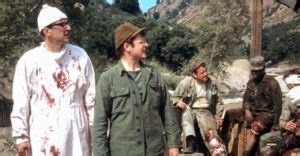


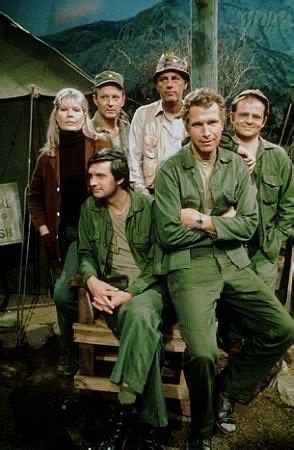
#This would make a cool fanfic idea if someone wants to steal it.#mash movie#tv: mash#mash#mash 4077#mashposting#radar o'reilly#hawkeye pierce#trapper john mcintyre#henry blake#frank burns#margaret houlihan#father mulcahy#maxwell klinger#Gary Burghoff is the only MASH cast member who also starred in the movie.
133 notes
·
View notes
Text
Albert Blithe
Alex Penkala
Alice
Alton More
Anna
Anthony 'Manimal' Jacks
Antonio 'Poke' Espera
Antonio Garcia
Army Chaplain Teska
Baba Karamanlis
Bernard DeMarco
Bill 'Hoosier' Smith
Bill Leyden
Billy Taylor
Brad 'Iceman' Colbert
Burton Christenson
Capt. Andrew Haldane
Carwood Lipton
Charles (Chuck) Grant
Charles Bean Cruikshank
Charles K. Bailey
Col. Robert Sink
Cpt. Bryan Patterson
Cpt. Craig 'Encino Man' Schwetje
Cpt. Dave 'Captain America' McGraw
Curtis Biddick
Darrell (Shifty) Powers
David Solomon
David Webster
Denver (Bull) Randleman
Donald Hoobler
Dr. Sledge
Edward (Babe) Heffron
Elmo 'Gunny' Haney
Eric Kocher
Eugene Jackson
Eugene Roe
Eugene Sledge
Evan 'Q-Tip' Stafford
Evan 'Scribe' Wright
Everett Blakely
Father John Maloney
Floyd (Tab) Talbert
Frank Murphy
Frank Perconte
Frederick (Moose) Heyliger
Gabe Garza
Gale 'Buck' Cleven
George Luz
Glenn Graham
Gunnery Sgt. Mike 'Gunny' Wynn
Gunnery Sgt. Ray 'Casey Kasem' Griego
Hamm
Harry Crosby
Harry Welsh
Helen
Herbert Sobel
Howard 'Hambone' Hamilton
Jack Kidd
James (Mo) Alley
James Chaffin
James Douglass
James Gibson
James Miller
Jason Lilley
Jean Achten
Jeffrey 'Dirty Earl' Carisalez
John 'Bucky' Egan
John Basilone
John Christeson
John D. Brady
John Fredrick
John Janovec
John Julian
John Martin
Joseph 'Bubbles' Payne
Joseph Liebgott
Joseph Toye
Josh Ray Person
Katherine 'Tatty' Spaatz
Ken Lemmons
Lance Cpl. Harold James Trombley
Larry Shawn 'Pappy' Patrick
Leandro 'Shady B' Baptista
Lena Basilone
Lew 'Chuckler' Juergens
Lewis Nixon
Lt. Edward 'Hillbilly' Jones
Lt. Henry Jones
Lt. Nathaniel Fick
Lt. Thomas Peacock
Lynn (Buck) Compton
Maj. 'Red' Bowman
Maj. John Sixta
Mama Karamanlis
Manuel Rodriguez
Mary Frank Sledge
Meesh
Merriell 'Snafu' Shelton
Navy Hm2 Robert Timothy 'Doc' Bryan
Neil 'Chick' Harding
Norman Dike
Old Man on Bicycle
Patrick O'Keefe
Phyllis
R.V. Burgin
Ralph (Doc) Spina
Renee Lemaire
Richard Winters
Robert 'Rosie' Rosenthal
Robert 'Stormy' Becker
Robert (Popeye) Wynn
Robert Leckie
Rodolfo 'Rudy' Reyes
Ronald Speirs
Roy Claytor
Roy Cobb
Sammy
Sgt. Mallard
Sidney Phillips
Stella Karamanlis
Teren 'T' Holsey
Vera Keller
Walt Hasser
Walter (Smokey) Gordon
Warren (Skip) Muck
Wayne (Skinny) Sisk
Wilbur 'Runner' Conley
William Guarnere
William Hinton
William J. DeBlasio
William Quinn
Winifred 'Pappy' Lewis
7 notes
·
View notes
Text
Happy birthday, McLean Stevenson (1927 - 1996), M*A*S*H’s Lt. Col. Henry Blake
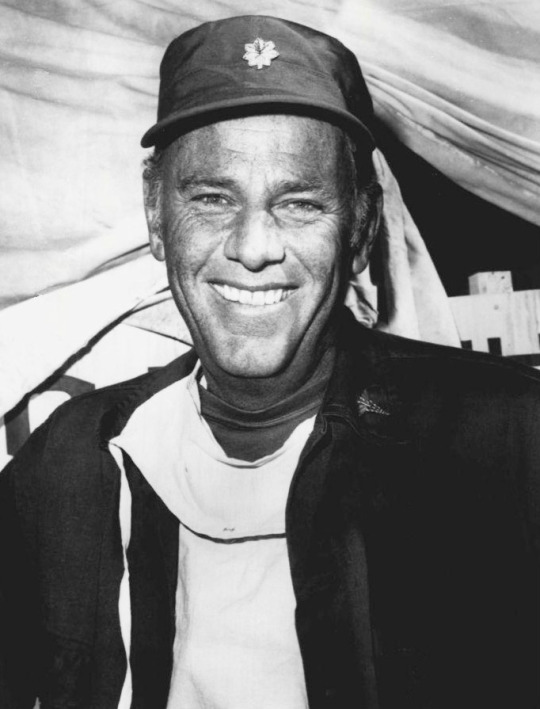
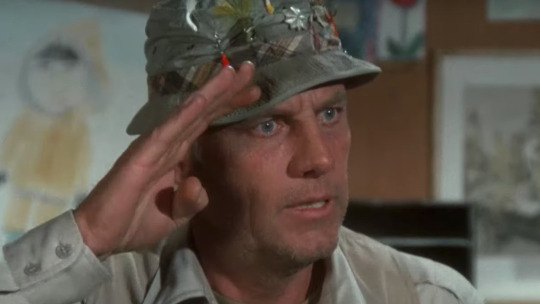
4 notes
·
View notes
Text
There are two kinds of novels in the collection of M*A*S*H novels.
Richard Hooker alone (or, I've occasionally read, with a ghost writer) wrote M*A*S*H, M*A*S*H Goes to Maine, and M*A*S*H Mania. These are episodic tales of madcap medical mayhem with quasi-technical surgery scenes. M*A*S*H is set in the Korean War, and was published in the sixties. The other two are set in Hooker's beloved rural Maine where Hawkeye and his three army bunkmates practice surgery together from the 50s through the mid-70s; Maine and Mania were published at either end of the 70s respectively.
Richard Hooker and William E. Butterworth (a pseudonym for W.E.B. Griffin, or vice versa, I dunno) co-wrote about a dozen novels published and set in the mid-70s. Some readers question whether Hooker was really involved in them but at least the first has a quasi-technical surgery scene. They're all titled M*A*S*H Goes To [some exotic location, often overseas], and are all non-episodic farces featuring mistaken identities, intercontinental airliner chases, authorities including actual contemporary public figures made to look foolish, and blatant misogyny. Hawkeye and Trapper John appear in each of them, at least more prominently than Duke and Oliver Jones do, and all feature reunions with past personnel or patients of the 4077th: Hot Lips (now Reverend Mother Emeritus Margaret Houlihan Wauchauf Wilson, R.N., Lt. Col., USA Ret., of the God Is Love In All Forms Christian Church, Inc.) and Father Mulcahy (now an archbishop and the Pope's chess and beer buddy) appear in almost all the novels. The world's greatest opera singer, an insufferable egotist who unfortunately is pretty much correct and who hangs out with a portly Arab oil prince, and a Cajun swampdweller who discovered oil on his land are former 4077th patients who appear in most or all the novels. Henry Blake is a general and is C.O. of Walter Reed Army Hospital. The Painless Pole is a henpecked fat old dentist in Michigan. Radar is CEO of his own fast-food empire and marries an opera singer, the sister of the insufferable egotist. Frank Burns remains a small doctor in a small town.
Hooker didn't like the tv series because it offended his conservatism. Both the Hooker/Butterworth novels and the later Hooker novels took occasional jabs at the tv series, especially for killing off Henry Blake. On almost the final page of the final novel, M*A*S*H Mania, Hooker has General Blake pay a visit to Crabapple Cove on the date of the airing of Abyssinia, Henry.
6 notes
·
View notes
Text
i am once again thinking about lt. col. henry blake
0 notes
Text
Cpl. Walter "Radar" O'Reilly:
[examining the inside of Lt. Col. Blake's ear] Wow!
Lt. Col. Henry Blake:
What? What is it? What do you see?
Cpl. Walter "Radar" O'Reilly:
I can't describe it... it's almost like a little Nativity scene...!
1 note
·
View note
Photo
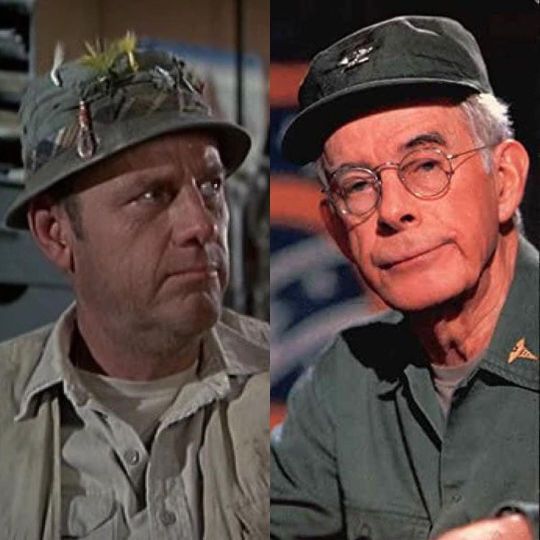
Some days at work I feel like Lt. Col. Henry Blake. Other days I feel like Col. Sherman T. Potter. https://www.instagram.com/p/CimETS3u24Z/?igshid=NGJjMDIxMWI=
0 notes
Photo
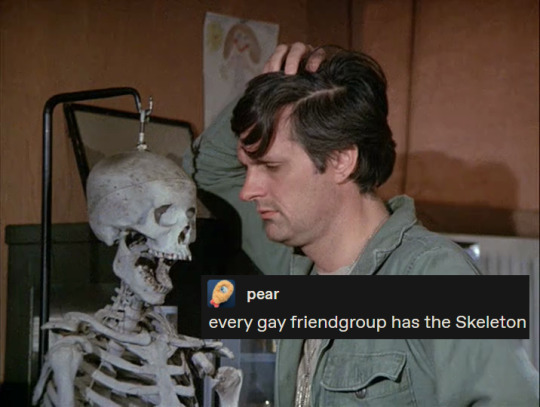
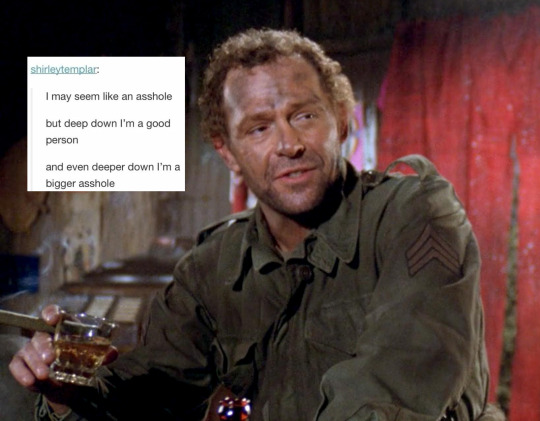
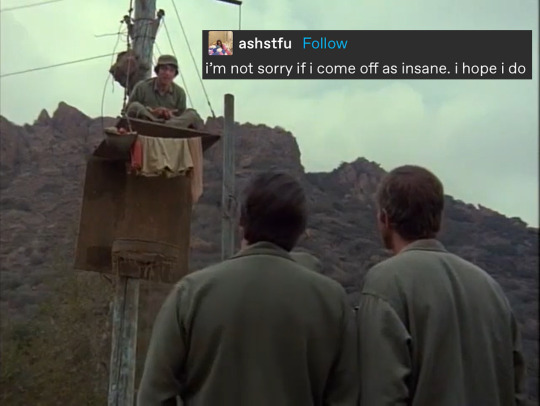
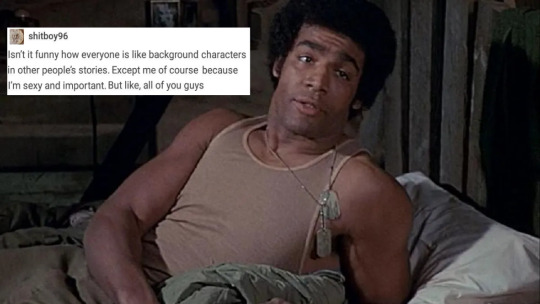
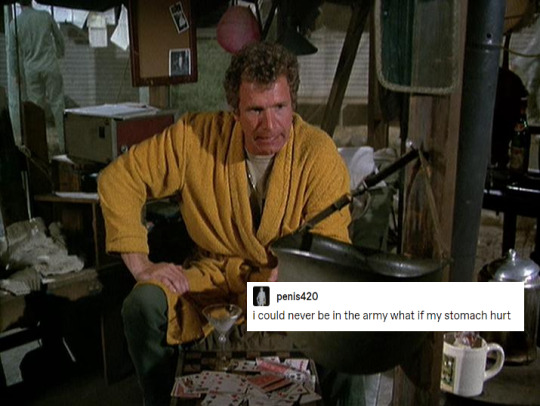


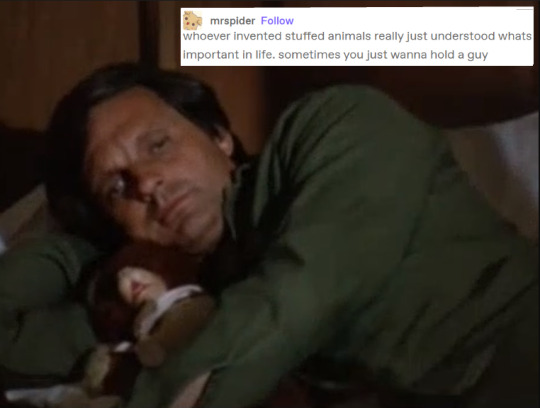
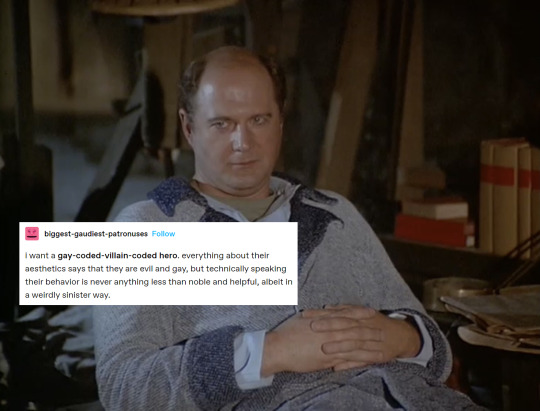
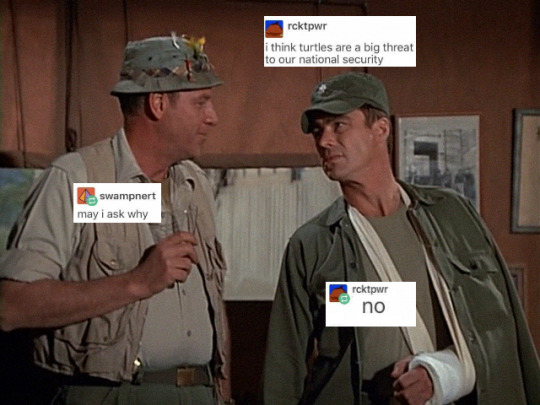
4077th Mash + text posts (7/??)
parts (1, 2, 3, 4, 5, 6,)
#M*A*S*H#mash 4077#hawkeye pierce#Lt Col Henry Blake#Maxwell Q Klinger#Jack Scully#Oliver Jones#trapper john mcintyre#charles emerson winchester III#Colonel Flagg#text post meme
475 notes
·
View notes
Photo

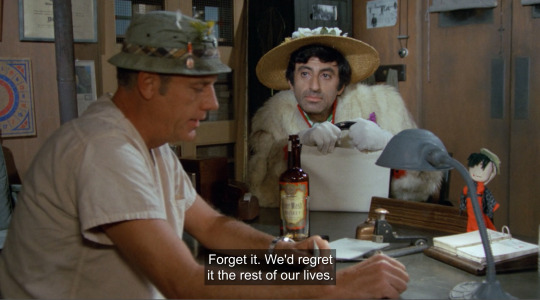
2K notes
·
View notes

